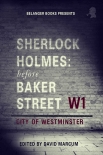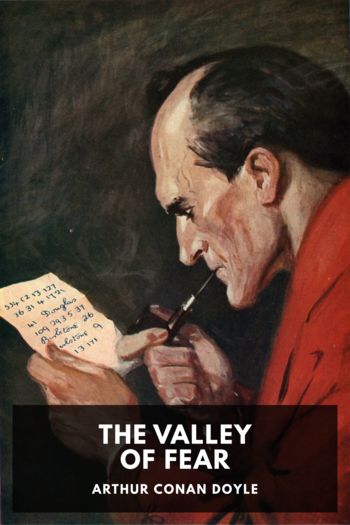Sherlock Holmes: Before Baker Street by David Marcum (books to read to be successful TXT) 📗

- Author: David Marcum
Book online «Sherlock Holmes: Before Baker Street by David Marcum (books to read to be successful TXT) 📗». Author David Marcum
He took a cab back to the Westminster Bridge Road and alighted at Number 121. The three-story red-bricked building was home to the Necropolis Railway. In ‘54, London seemed on the verge of running out of burial space. It was decided to open a new cemetery in Brookwood, Surrey. Of course, the distance presented a problem for mourners, and so the Necropolis Railway was established. They transported around fifty bodies a day for burial or cremation.
From Holmes’s description, a guardsman identified the dead man as Dutch Winkle. “You’re telling me he’s dead? Ah, poor Dutch. What happened?”
“His body was found under the railway bridge.”
“The railway bridge? What was he doing there?”
“I was hoping you might know.”
“Not I, sir. Dutch would have gone the other way if he were going home.”
“Home was where?”
“Coral Street.”
“The opposite direction, I see. Was he working last night?”
“Reckon he must have been, if he were found up t’road.”
“You do not know?”
“Not I. You could ask Mr. Larkman. He’s the company secretary.”
The fellow directed Holmes. The detective’s footsteps clanged on the wrought iron stairs as he made his way up to the third floor.
Larkman heard Holmes’s news with dismay. “Mr. Winkle is dead? Well, that is a blow, a grievous blow indeed. A fine, upstanding gentleman, very good with the mourners.”
“What was his position?”
“He was our supervising manager. He served as a mourners’ attendant. He greeted them, made sure they were comfortable for the journey, saw the coffins were properly placed. You don’t want coffins, especially the cheaper ones, to fall over in the middle of a journey. Very nasty. Then, when the train reaches Brookwood Cemetery, he takes – took, I should say – the mourners to the chapel.
“Although it was not his domain, he did keep an eye on the waiting rooms. We have eight for the first-class mourners, alone.”
“Excuse me? Do you mean to say you segregate the classes . . . for a funeral?”
“Certainly. Though I should say the facilities for the second- and third-class mourners are excellent, too. We also keep the various religious denominations and the, ahem, non-believers separate. The niceties must be observed. In many respects, Mr. Winkle was the face of our company. I do not know how we shall replace him.
“He made sure that the bodies were correctly identified, that the paperwork was in order, and he oversaw the day-to-day management of affairs. He was with us twenty-six years, ever since the company opened. Was it his heart? He hadn’t been feeling well since Christmas. I suggested he see a doctor, and he promised he would do so on Tuesday when he had a day off.”
“His body was found under the Westminster Railway Bridge in the early hours of the morning. Did he work last night?”
“Perhaps, if one of the hotels had a death. Let me check the ledger.” He took down a large book and flicked through the pages.
“Hotels?” Holmes asked.
“Oh yes, indeed. If a guest should die in a hotel and the landlord wants to avoid a scandal, we are notified and collect the body in the middle of the night, with no one the wiser.”
Holmes had a sudden, horrifying image of murdered bodies being spirited away by the Necropolis Railway in the dead of night.
“You mean, you just go and pick up a corpse, no questions asked?” he said.
Mr Larkman blinked. “What? Oh, no, there must be a death certificate. We are most fastidious about the details, Mr Holmes.
“Mr. Winkle was our primary liaison with the hotels. If he were called out, he would have made note. Ah, yes, you see here. A call to the Lampton Inn on the Caledonian Road at one a.m.”
“How would the hotel have contacted him? Telegram?”
“Telegram if the hotel were some distance away. Otherwise, they’d dispatch a messenger. Some of the hotels worked directly with Mr. Winkle. They knew him, you see, could rely upon his discretion. He’d have received the message at home and come here to collect a hearse.”
“He would not have collected a body on his own, I suppose?”
“To be frank, I am not certain how Mr. Winkle would have proceeded. He was very much his own man, you see. Very likely he would have collected one of his colleagues along the way, probably Mr. Graves. He is on duty, if you would like to speak to him?”
Mr. Graves was a heavy-set man, burly and tattooed. Even without the anchor on his left forearm, Holmes could tell he was a former sailor by his gait. The scars on his hands told of time aboard a whaler.
“Last night?” he said in a heavy Cornish accent. “No, I never heard from him. Poor old Winkle. I’m sorry to hear he’s gone. Good man, he was.”
“What was his routine when he needed to attend a body from a hotel?” Holmes asked.
Graves released a long puff of air as he thought. “Well, it varied. Some of the hotels were fussy about how they wanted things handled. Mr. Winkle knew all their little peculiarities and accommodated them as much as possible. I’m surprised he didn’t ask me to help him.”
“I’m puzzled,” Mr. Larkman said, “Surely he would not have moved a body on his own?”
“Depends on the sort of message he got,” Graves replied. “Sometimes the situation is still unfolding, if you get my drift. There are hysterical family members or ladies who are not the gentleman’s wife . . . Mr. Winkle may have thought it best to go appraise the situation and then see what help he might need, if any. Which hotel was he called to? Oh, that explains it. They’re not





Comments (0)